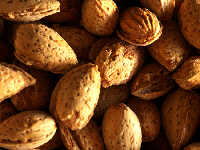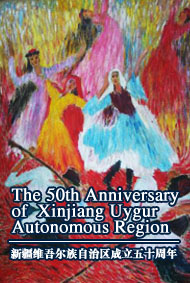|
Almond
( 2005-09-13 )
 The almond is one of the most treasured dried fruit of the Uygur people. It is actually not a nut, but a plant of the almond tree subgenus in the peach genus. Its nutrition is many times higher than that of beef of the same weight. A kernel typically contains vegetable oil (55-61 percent), protein (28 percent), and amylum (a complex starch) and sugar (10-11 percent), as well as vitamins and 18 trace elements. The almond is one of the most treasured dried fruit of the Uygur people. It is actually not a nut, but a plant of the almond tree subgenus in the peach genus. Its nutrition is many times higher than that of beef of the same weight. A kernel typically contains vegetable oil (55-61 percent), protein (28 percent), and amylum (a complex starch) and sugar (10-11 percent), as well as vitamins and 18 trace elements.
The Almond has more than 40 varieties of 5 families in Northwest China'sXinjiangUygur Autonomous area. Better almonds can be made into relieving medicine that can make it easier to expel phlegm from the chest or lungs, exert a restorative influence on the intestines, and improve bowel movement.
The almond is also often used to cure diseases like hypertension, neurasthenic (general listlessness and so on), hypersensitive skin, tracheitis (windpipe inflammation), and infantile rickets.
In short, the almond, with its tonic effect, is the best choice for the Uygurs to keep healthy.
In addition, almonds can also be pressed into almond oil and used as an industrial product.
Xinjiang sweet almonds are the traditional product for export and an indispensable material from which almond tea, almond icing, and almond chocolate are made.
|

